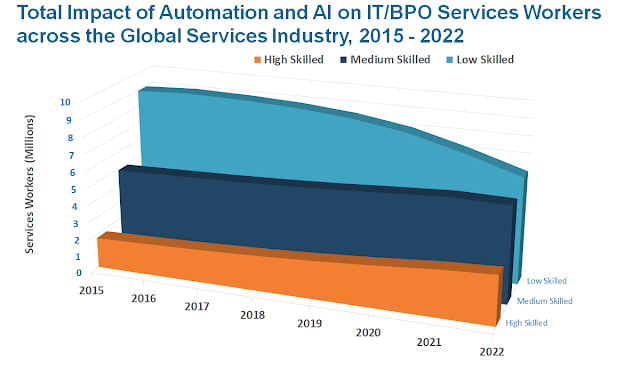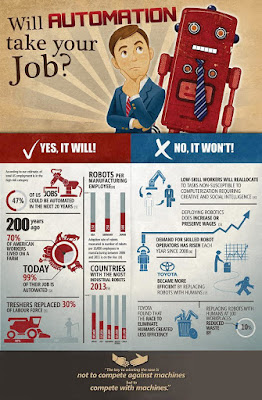Automation taking our jobs
July 06, 2018
Artificial intelligence and increasing automation is going to decimate middle class jobs, worsening inequality and risking significant political upheaval. Automation has the potential to transform future jobs and the structure of the labor force, automation in manufacturing has steadily decreased costs for decades, making manufactures more competitive while also reducing the amount of labor required to produce them. Automation will displace many jobs over the next ten to 15 years, but many others will be created and even more will change. Jobs of the future will use different skills and may have higher educational requirements. Here are some points that are important to understand about automation in jobs.
- The employment impacts of automation in a particular industry depend on the nature of the industry. Automation lets organizations lower costs and therefore prices. In industries where lower prices don’t lead to significantly more demand for a good or service, automation allows fewer workers to produce the same output. But in industries where lower prices spur more demand, automation allows the same number of workers to produce more output.
- Technology-driven automation is central to the process of increasing our living standards. That is because better “tools” allow us to produce more. It is only by producing more that workers can earn more and companies can lower prices, both of which increase living standards.
- Automation does not lead to net job loss. Even if automation eliminates some of the jobs in a particular industry, it does not reduce jobs in the overall economy. The reason is that no organization automates unless it saves money, and those savings get passed on to consumers, who in turn use those savings to buy something else. That spending creates jobs in other parts of the economy.
- Automation has differing effects on occupations. Some (such as travel agents) have seen employment declines because of new technology. Others have seen gains, either from increases in standards of living (e.g., because more people can afford to hire childcare workers), or because a new technology creates new occupations directly (e.g., computer scientists).
- Automation has differing effects on regions. Regions that have a higher share of employment in industries that experience faster productivity gains (as is the case with manufacturing) will see slower job growth, on net, than regions with a higher share of industries that experience slower productivity growth (such as business services).
- Limiting automation to protect workers would hurt growth. In some industries where demand doesn’t grow enough from the lower prices automation brings, there will be employment effects. In some cases, workers may be laid off. In other cases, companies may not hire new workers to replace those who leave voluntarily. But either way, there can be fewer jobs in particular industries. It is easy to succumb to the view that we should avoid this outcome at all costs, because it can involve painful dislocation for some workers. But those costs come at considerable benefit to everyone else who enjoys higher living standards than they otherwise would. So, the focus instead should be on easing displaced workers’ transitions into new jobs.
- We do not need universal basic income. In response to hypothetical fears that automation will lead to mass joblessness, some have called for universal basic income (UBI), where the state provides income to all adults, working or not. This is a bad idea. Automation does not raise unemployment rates, but UBI will, because it will both encourage people not to work and divert spending from activities that would create more jobs for people without jobs.
-
Automation itself does not lead to net job gain. Some jobs will be created making new tools, but the use of new tools will always eliminate more jobs. No organization invests in automation if the net-present value costs are greater than savings.In other words, if it takes 100 hours of work to build a machine that saves 90 hours of work, no company will adopt it.
The Automation tools are maturing and there are more and more automation tools becoming available cheaply (and free as well). When the capability of these tools are available to companies, they will not think twice before adopting them to increase their productivity, defect prevention and capacity increase, with cherry on the cake being reduced cost.












0 comments